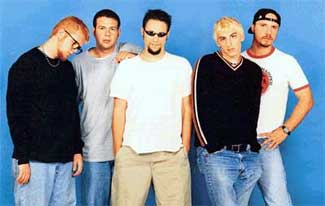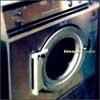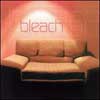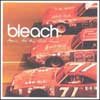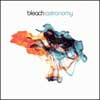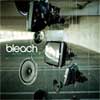Bleach
Genre: Rock
Official Web Site
Bleach Bibliography: (click on each album cover to view tracks and Bleach lyrics)
Bleach Biography Sometimes, a coat of paint serves the purpose. Other times, you have to rip the guts out, draw up some new plans, and rebuild from the ground up. It can happen with cars, it can happen with houses, and it can happen with rock bands.
But, do it right, do it with thought and skill and energy, and that rebuilding process and the final product itself can turn out better than you would ever have imagined.
It can feel like you're starting Again, For The First Time.
For guitarist Sam Barnhart and vocalist Dave Baysinger, the veteran core of the rock band Bleach, the turn of the millennium had them thinking that maybe it was time to close the book on the band they'd been part of for the better part of the '90s.
Members had come and gone (amicably, mind you), they had ended their affiliation with their record label, and a certain kind of preprocessed pop was dominating the airwaves.
Sam and Dave both returned to their home state of Indiana and were getting themselves prepared for a life after Bleach when conversations with various friends and family members planted the seed that maybe it wasn't time to let go just yet.
"As we got away from it and reevaluated and got a new vision for what we were doing, things started falling into place," Sam says. "Things that kinda told us it wasn't time to stop, that it was just the beginning and everything up till now was just preparation for what was to come. That made it real exciting for us again."
Some of those things included the gradual formation of a new Bleach, which features guitarist Milam Byers, bassist Jerry Morrison and drummer Jared Byers. The new band hit the road with a vengeance, taking time to gel as a live unit, and started to plot out a course for new material.
"Milam, Jared and Jerry have all put in a whole new level of musicianship and new ideas. Dave and I have been writing together for the past eight years, and it's easy to think you're doing something new with it and you come to find out, it's kind of a rehash," Sam says. "To have the new ideas from these guys and the different thought processes, it really pushed us to think through the songs past 'here are four chords that sound good together, let's put a melody to it.'"
They embarked (along with producer Oran Thornton of Flick) on recording new songs for a record that didn't have a label home. Where other established bands might have approached this time with a sense of trepidation, the men in Bleach reveled in their artistic freedom, not to mention their freedom to simply rock out.
"We tracked half of the record without a label, just hoping it would work out. Tooth & Nail heard those six songs and gave us total freedom to finish it up," says Dave of the record that has become their Tooth & Nail debut, Again, For The First Time. "It's probably, somewhat, a better reflection of what we've always wanted to be. It's weird, because it's kinda what the vision of the band has always been, and it's finally come into fruition."
The songs on Again, For The First Time are straight-ahead, crisp, clean rock tunes that live equally well sliding through headphones or blasting through rib-shaking speakers. They sometimes ask more questions than they answer, but any question that can be answered in a three-and-a-half minute rock song may be better left unasked anyway.
It's in the acknowledging that there are questions where the encouragement and power of Bleach's music can shine through. The dark introspection of songs like "Knocked Out," "Broke In The Head" and "Fell Out" are balanced by tracks such as "Celebrate," "Base Line" and the first single "We Are Tomorrow," and all rock with an intensity that may surprise longtime fans and newcomers alike.
Of "We Are Tomorrow," Sam says, "I'd been working on the idea when we were making our last record in '99. The whole theme was sitting there, but it was something we couldn't finish, and it's interesting that when the five of us got together as the new band, it was the first song we finished together.
"It's an anthem for the youth, the simple statement that we are tomorrow and there's hope in that. We don't have to do things the way they've always been done; we can change things."
Concerning the state of early 21st century music, the members of Bleach are even more expressive. They know that the core of rock music is emotion, and they're not opposed to tapping in to that. "There's an energy or an emotion to rock 'n' roll that people identify with and we're starting to see a backlash with things like teen pop and rap-metal," Jerry says. "You see all these bands, like The Strokes, Jimmy Eat World, Weezer, and when you get down to it, they're just guitar rock bands. People want to see something real, raw and rock, not this big ol' show. It's a good time to be a rock band."
"There's just a new energy to everything, so that's why I think this record is more cohesive than any other Bleach record," Milam says. "All five of us have been in different bands, and for the first time, we're all in a band whose members all want the same things. We went in and tried to write 12 great rock songs. I think we might have done it, but only time will tell."
And while time can betray the exterior of a car or a house or a rock band, the old axiom goes that it can't touch what's on the inside. Only honesty, communication and good ol' rock 'n' roll can do that.
Discover it Again, For The First Time
|


